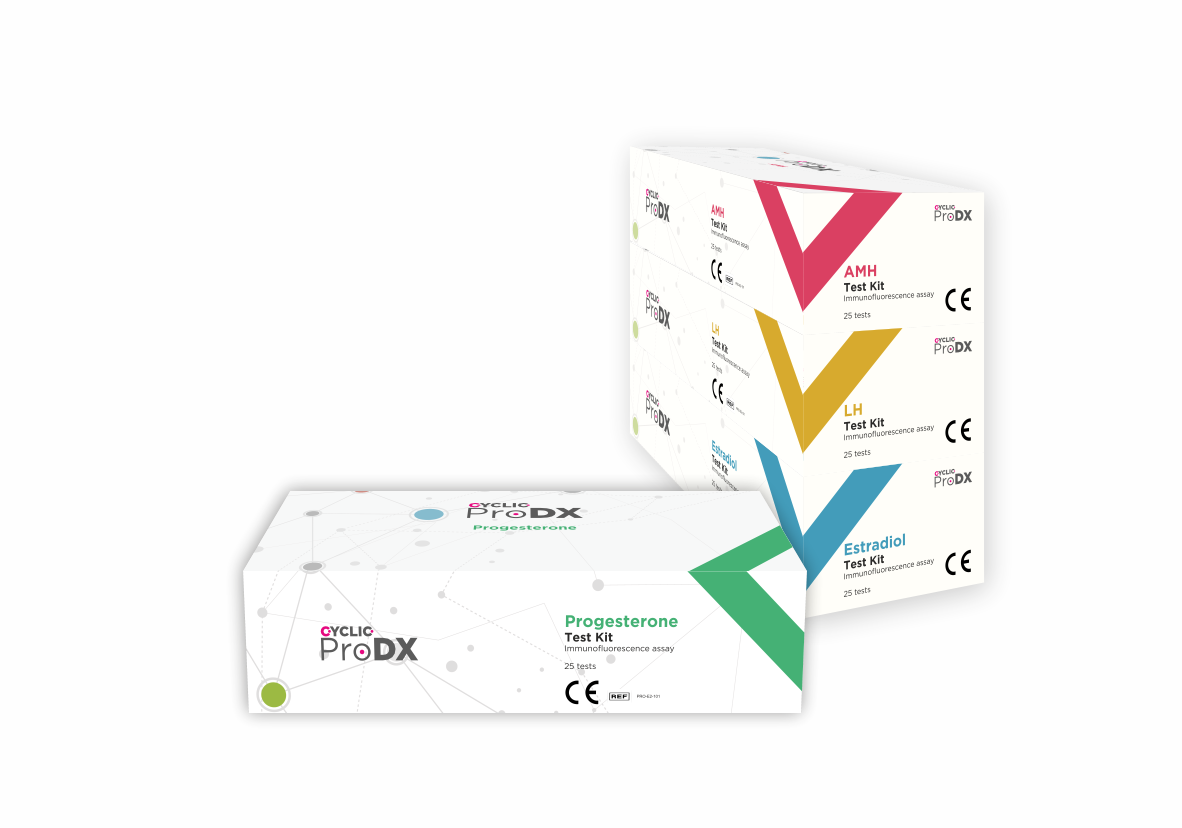Make hormone testing rapid
Bringing fertility hormone testing closer to the patient
In today's fertility market, innovation is key to delivering value for patients and making their fertility journey as easy as possible. Cyclic Diagnostics has brought its range of Cyclic ProDX test kits based on innovative immunofluorescence technology into fertility clinics, allowing hormone results to be delivered in under 30 minutes and accelerating treatment decisions.
We plan to expand our range of available test kits to provide a comprehensive suite of hormone testing options. If you are interested in any tests that are not currently available, let us know your needs here.

Cyclic ProDX™ Test Kits
|
WHY TEST ESTRADIOL? Growing follicles produce estradiol so monitoring estradiol alongside transvaginal ultrasound is routinely used to check the growth and size of follicles. Monitoring estradiol can also help towards monitoring the risk of ovarian hyperstimulation syndrome (OHSS). |
INTENDED USE In vitro quantitative determination of estradiol in human serum or plasma samples. PERFORMANCE CHARACTERISTICS Measuring range: 147 - 17,616 pmol/L |
|
WHY TEST LH? Luteinizing hormone (LH) is monitored during in vitro fertilization (IVF) because it plays a crucial role in the ovulation process. A surge in LH triggers the release of the mature egg from the follicle in the ovary, and this is the optimal time for egg retrieval during IVF. Monitoring LH levels helps fertility specialists time the administration of human chorionic gonadotropin (hCG), a hormone that mimics LH, to induce the final maturation of the eggs before retrieval. This precise timing is essential for the success of IVF, ensuring that mature eggs are available for fertilization. Tracking LH levels helps optimize the chances of obtaining viable eggs during the IVF process. |
INTENDED USE In vitro quantitative determination of LH in human serum or plasma samples. PERFORMANCE CHARACTERISTICS Measuring range: 0.2 - 150 IU/L |
|
WHY TEST PROGESTERONE? Progesterone is crucial for the preparation of the uterine lining for embryo implantation during in vitro fertilization (IVF). Monitoring progesterone levels helps to check that levels are optimised to ensure that the endometrium is receptive and supportive for embryo implantation. |
INTENDED USE In vitro quantitative determination of progesterone in human serum or plasma samples. PERFORMANCE CHARACTERISTICS Measuring range: 1.9 - 127 nmol/L |
|
WHY TEST AMH? In women, anti-Müllerian hormone (AMH) is produced within cells inside the follicles of the ovaries. Monitoring AMH levels gives an indication of the number of remaining eggs that a woman has and can also reveal how well a woman may respond to fertility drugs in preparation for in vitro fertilization (IVF). |
INTENDED USE In vitro quantitative determination of AMH in human serum or plasma samples. PERFORMANCE CHARACTERISTICS Measuring range: 0.71 - 143 pmol/L |
|
WHY TEST FSH? Follicle-stimulating hormone (FSH) testing is commonly undertaken as part of the initial evaluation and ongoing monitoring in in vitro fertilization (IVF). It can indicate the patient's ovarian reserve and can be a predictor for how well a woman will respond to ovarian stimulation as well as the likelihood of a successful pregnancy. Additionally FSH testing can help diagnose certain underlying conditions that affect fertility such as polycystic ovary syndrome (PCOS). |
INTENDED USE In vitro quantitative determination of FSH in human serum or plasma samples. PERFORMANCE CHARACTERISTICS Measuring range: 0.2 - 150 IU/L |
